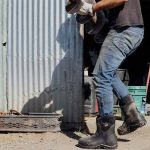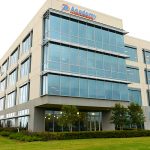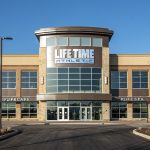New Balance released its first comprehensive Responsible Leadership report this month that offers a deeper look into the company’s history, culture, values and sustainability efforts. It outlines the challenges faced by the company, initiatives to address them and targets put in place for global New Balance associates.
“We are pleased to share our first public accounting of our Responsible Leadership efforts,” says Rob DeMartini, president and CEO. “I am convinced that business is a powerful force for social change and that one way we all can move forward is to acknowledge our achievements and challenges. In our 106-year history, New Balance has followed its own path, making long-term choices that sustain our business and keep us on the road to success. It is the role of Responsible Leadership to help lead the way over the next 100 years.”
Founded in Boston in 1906, New Balance made its first pair of running shoes in 1938 and today is the only company to manufacture athletic shoes in the United States. New Balance owns and operates five U.S-based athletic footwear factories and one in Flimby, UK. In addition, as a U.S. manufacturer, the company purchases goods and services from many U.S.-based suppliers who employ additional workers.
The company’s global Responsible Leadership program focuses on three core areas including: providing a safe, healthy, and respectful work environment, enhancing environmental sustainability, and supporting communities in which we operate.
Providing a Safe, Healthy, and Respectful Workplace
New Balance strives to be an employer of choice through maintaining domestic manufacturing, an unwavering focus on innovation, and dedication to its associates and their ongoing success. The company has a comprehensive program of training, education, and solicitation of feedback, and New Balance seeks to promote from within wherever possible. Particular training focus is on helping manufacturing associates develop a sense of pride in the craft of shoe making that is embedded in the success of our lean manufacturing system, which integrates Toyota Production System (TPS) principles into its domestic and UK factories.
New Balance seeks to have a positive impact on all of the communities where it operates, including a commitment to ensuring that any worker who is a member of the company’s global supply chain is treated with respect. The company began addressing social compliance with its contract footwear supplier in the late 1990s. The company has an extensive health and safety program for its own facilities in the U.S. and UK, and has built a comprehensive program for contract manufacturers to enhance their management capacity, provide them with appropriate technical assistance, and give them feedback through auditing and inspections.
Recognizing that there is much to be learned from others, New Balance is an active member of the Fair Labor Association, the International Labor Organization (ILO)’s Better Work Program, and the Fair Factories Clearinghouse, as well as a founding member of the Sustainable Apparel Coalition. In partnership with industry experts, NGOS, trade unions, governments, brands, and other members of civil society, New Balance seeks to drive social change and address issues that no one brand can address alone.
Environmental Initiatives
New Balance’s current product priorities include increasing the use of environmentally preferred materials (EPMs) in apparel and footwear, waste reduction, better chemical management, sustainable design, eco indexing, and collaboration and industry involvement.
In its own operations at its New England manufacturing facilities, warehouses, and retail stores, New Balance has implemented a variety of energy saving initiatives and extensive recycling programs. The company’s domestic manufacturing facilities operate in historic structures that are upgraded and outfitted with state of the art shoe making equipment preserving cultural and environmental resources.
The company’s Restrictive Substances program is designed to protect the environment of the host communities where it makes products, the health of workers in manufacturing facilities, consumer health and New Balance’s brand integrity. It is applied to all footwear, apparel and equipment that New Balance makes (both in owned and contract factories) as well as to all products made by company licensees.
Philanthropy & Community
The company’s charitable efforts date back to 1954, when it made its first charitable contribution. Since then, as business has grown, so has its giving efforts. New Balance and the New Balance Foundation invested more than $50 million in the past 8 years in causes such as preventing childhood obesity.
Outside of the Foundation, New Balance philanthropy includes corporate giving and cause marketing. New Balance has partnered with Susan G. Komen for the Cure at the corporate level since 1989. New Balance sponsors many other local and regional charitable organizations including military support initiatives and charity road races. In addition, New Balance associates volunteer year-round through the company’s Community Connection program, donating more than 4,500 hours on service projects in 2011.
“We are pleased to share our first public effort to showcase our Responsible Leadership efforts,” says Christine Madigan, Vice President for Responsible Leadership. “The company’s vision of corporate social responsibility has grown authentically from the way we have always conducted business. We have a long history of striving to create an environment that our associates value, giving back to the communities in which we operate and manufacture and being careful about the resources we use. While we believe we have accomplished much in our more than 100 years of operation, we acknowledge that Responsible Leadership is an evolution and our efforts here, as with all company initiatives, are continuously evolving and improving.”
New Balance welcomes feedback on its Responsible Leadership performance. To view the full report, please visit http://www.newbalance.com/Responsible-Leadership/about_responsible_leadership,default,pg.html.
Comments may be submitted to RLReport@Newbalance.com.
New Balance employs more than 4000 associates around the globe, and in 2011 reported worldwide sales of $2.04 billion.
New Balance Releases First Responsible Leadership Report
Creating a safe and healthy work environment that fosters learning and development, advances sustainable business practices, operates with integrity and humanity, and contributes to the health and well being of consumers and communities.
Treading lightly on limited resources, striving for zero waste, and assessing the lifecycle impacts of products and activities.
Driving sustainable change through giving, grants and volunteerism in the company’s global communities.















